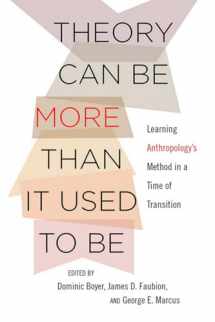
Theory Can Be More than It Used to Be: Learning Anthropology's Method in a Time of Transition
ISBN-13:
9781501700071
ISBN-10:
1501700073
Edition:
1
Author:
George E. Marcus, James D. Faubion, Dominic Boyer
Publication date:
2015
Publisher:
Cornell University Press
Format:
Hardcover
296 pages
Category:
Methodology
,
Social Sciences
,
Research
,
Cultural
,
Anthropology
,
Sociology
FREE US shipping
Book details
ISBN-13:
9781501700071
ISBN-10:
1501700073
Edition:
1
Author:
George E. Marcus, James D. Faubion, Dominic Boyer
Publication date:
2015
Publisher:
Cornell University Press
Format:
Hardcover
296 pages
Category:
Methodology
,
Social Sciences
,
Research
,
Cultural
,
Anthropology
,
Sociology
Summary
Theory Can Be More than It Used to Be: Learning Anthropology's Method in a Time of Transition (ISBN-13: 9781501700071 and ISBN-10: 1501700073), written by authors
George E. Marcus, James D. Faubion, Dominic Boyer, was published by Cornell University Press in 2015.
With an overall rating of 3.7 stars, it's a notable title among other
Methodology
(Social Sciences, Research, Cultural, Anthropology, Sociology) books. You can easily purchase or rent Theory Can Be More than It Used to Be: Learning Anthropology's Method in a Time of Transition (Hardcover) from BooksRun,
along with many other new and used
Methodology
books
and textbooks.
And, if you're looking to sell your copy, our current buyback offer is $0.3.
Description
Within anthropology, as elsewhere in the human sciences, there is a tendency to divide knowledge making into two separate poles: conceptual (theory) vs. empirical (ethnography). In Theory Can Be More than It Used to Be, Dominic Boyer, James D. Faubion, and George E. Marcus argue that we need to take a step back from the assumption that we know what theory is to investigate how theory―a matter of concepts, of analytic practice, of medium of value, of professional ideology―operates in anthropology and related fields today. They have assembled a distinguished group of scholars to diagnose the state of the theory-ethnography divide in anthropology today and to explore alternative modes of analytical and pedagogical practice.Continuing the methodological insights provided in Fieldwork Is Not What It Used to Be, the contributors to this volume find that now is an optimal time to reflect on the status of theory in relation to ethnographic research in anthropology and kindred disciplines. Together they engage with questions such as, What passes for theory in anthropology and the human sciences today and why? What is theory’s relation to ethnography? How are students trained to identify and respect anthropological theorization and how do they practice theoretical work in their later career stages? What theoretical experiments, languages, and institutions are available to the human sciences? Throughout, the editors and authors consider theory in practical terms, rather than as an amorphous set of ideas, an esoteric discourse of power, a norm of intellectual life, or an infinitely contestable canon of texts. A short editorial afterword explores alternative ethics and institutions of pedagogy and training in theory.


We would LOVE it if you could help us and other readers by reviewing the book
Book review

Congratulations! We have received your book review.
{user}
{createdAt}
by {truncated_author}


